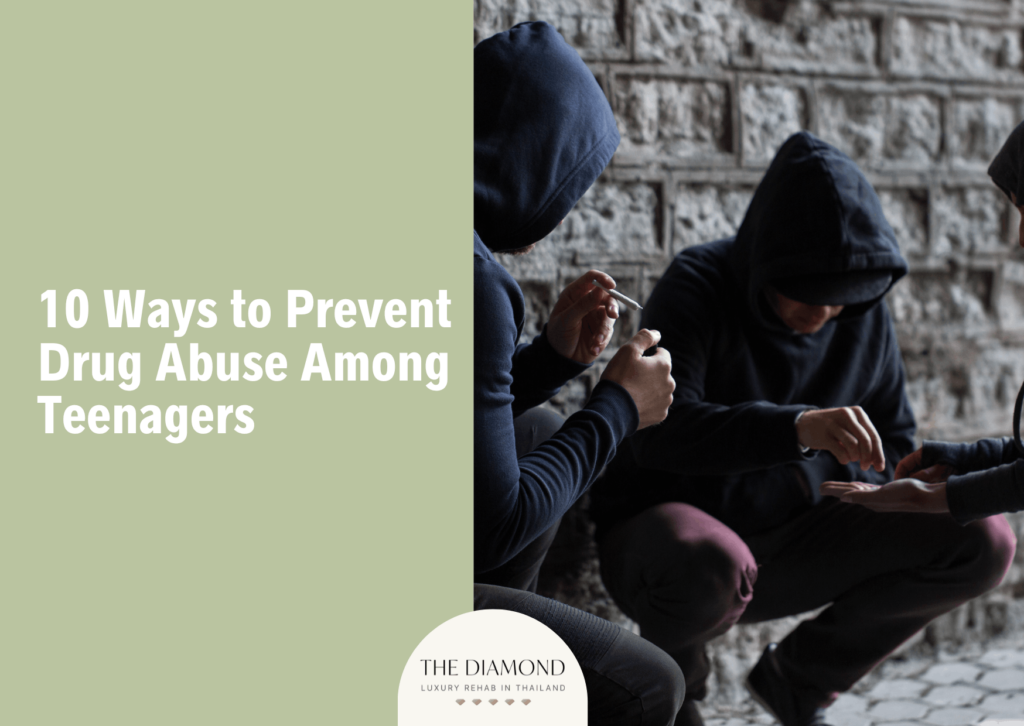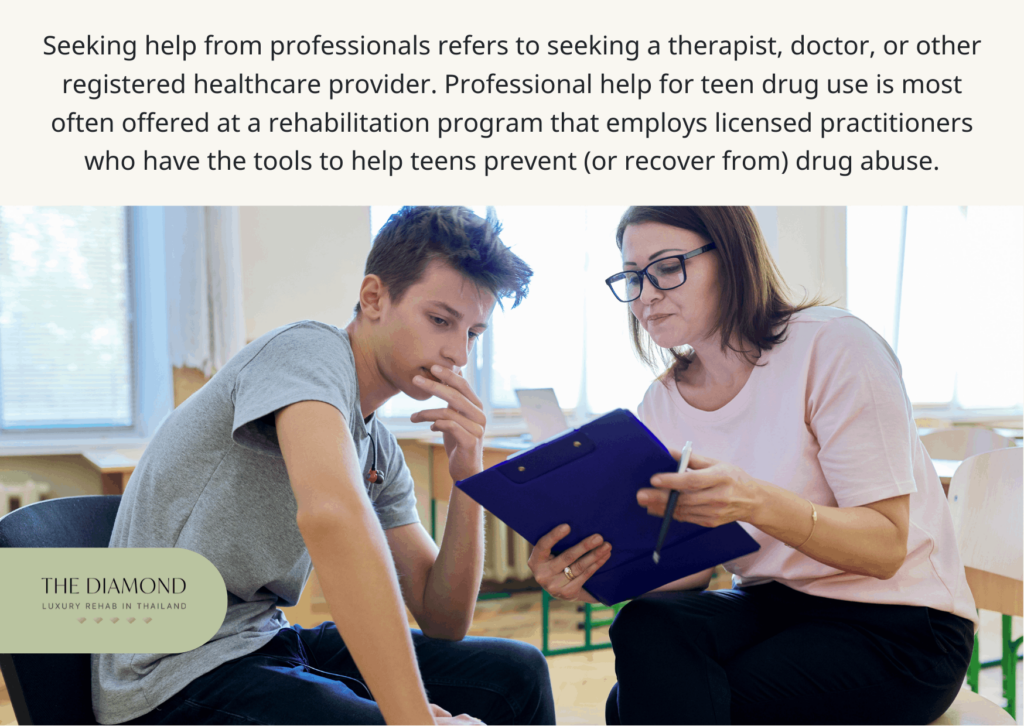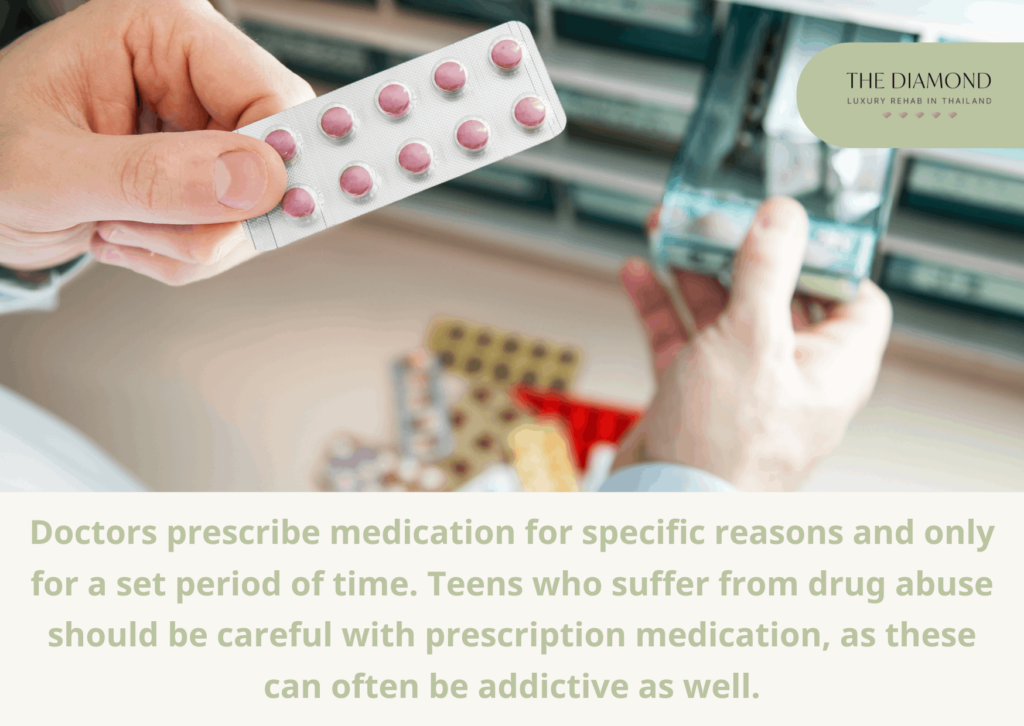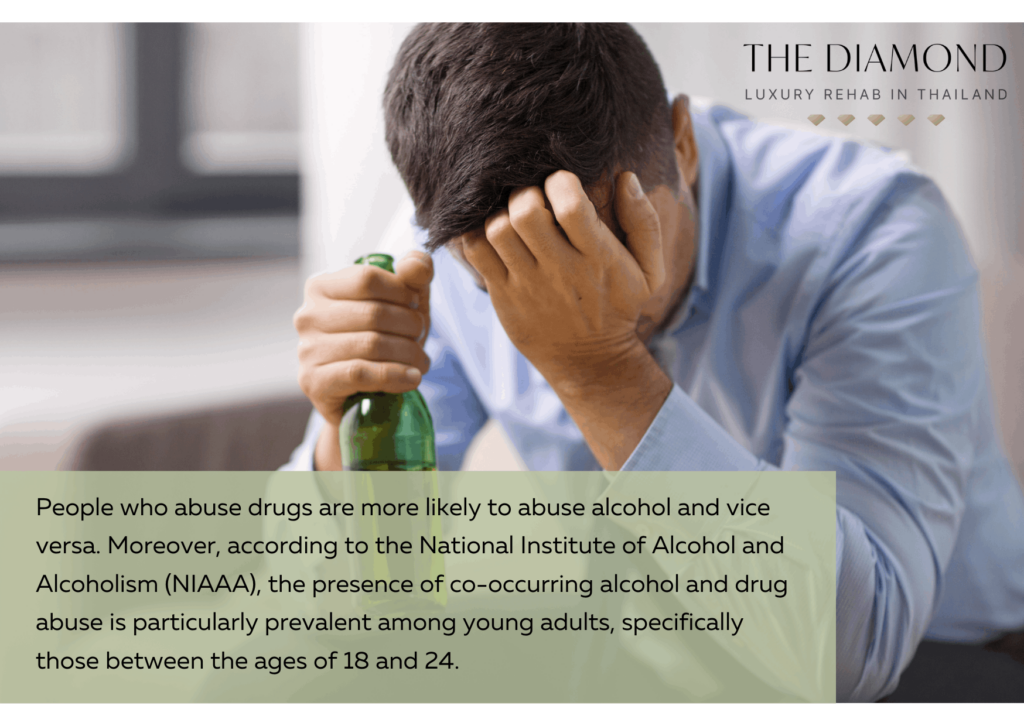10 ways to prevent drug abuse among teenagers
Table of content
- What is drug abuse?
- How can teens prevent drug abuse?
- 1. Resist peer pressure
- 2. Abstain from drug use
- 3. Seek professional help
- 4. Live a healthy, balanced lifestyle
- 5. Foster strong family relationships
- 6. Take time for self-care
- 7. Learn healthy coping skills
- 8. Obtain education on the dangers of drug abuse
- 9. Take only prescribed medication
- 10. Practice mindfulness activities
- How can the community or society help prevent drug abuse in teens?
- What are the signs of drug abuse in teens?

Drug abuse in teens is a pressing issue that raises concerns among parents and health professionals alike. During adolescence, the human brain is still in the crucial stage of development, making it particularly vulnerable to the harmful effects of drug use.
The long-term consequences of teen drug use during this maturing period can have severe impacts on various aspects of a teenager’s life. These effects include deteriorating mental health, impaired cognitive functions such as memory deficits, and even disruptions in normal growth and delayed puberty.
There are strategies that can be employed to prevent substance abuse in teens, including resisting peer pressure, abstaining from drug use, and living a balanced lifestyle.
What is drug abuse?
Drug abuse refers to a compulsive pattern of harmful and dangerous use of psychoactive substances, according to the World Health Organization. Drug abuse has recurrent and significant consequences on one’s social, work, or academic life.
Drug use refers to low-frequency use and experimentation with a drug. However, drug use becomes drug abuse when the individual overlooks the consequences of drug use due to the strong desire to use. Drug abuse will alter the individual’s lifestyle and could also alter daily relationships.
How common is drug abuse in teens?
Roughly 50% of teenagers in the United States have misused drugs at least once, and 8% of teens regularly use psychoactive substances, according to the National Center for Drug Abuse Statistics. Some of the reasons for teenage drug abuse include forgetting their troubles, curiosity, expressing their independence, and peer pressure. Drug use is bad for teens because it can have some serious consequences. According to the U.S. Office of Justice Programs, these consequences include poor academics, a negative impact on physical health, alienation from peers and family, and delinquency.
The most common drugs that teenagers abuse are alcohol, marijuana, stimulants (cocaine, crack, and speed), opiates or opioid painkillers, and prescription drugs, according to The American of Child and Adolescent Psychiatry.
How can teens prevent drug abuse?
There are 10 ways for teens to prevent drug abuse:
- Resist peer pressure
- Abstain from drug use
- Seek professional help
- Live a healthy, balanced lifestyle
- Foster strong family relationships
- Take time for self-care
- Learn healthy coping skills
- Obtain education on the dangers of drug abuse
- Take only prescribed medication
- Practice mindfulness activities
1. Resist peer pressure
Peer pressure is the coercion exerted by friends or acquaintances to do certain things or act a certain way. Though it can also stem from individual concerns about others’ opinions as peers play a large role in adolescents’ emotional and social development, according to the American Academy of Child and Adolescent Psychiatry.
Peer pressure also plays an important role in the initiation of drug abuse, according to Ranjan et al. in their 2010 article published in the Biomedical Research Journal. Thus teens should be encouraged to resist pressure from their peers that is dangerous or illegal, such as drug abuse.
When friends begin experimenting with drugs and alcohol, and one feels pressured to join, resisting that pressure is of utmost importance. If the pressure feels overwhelming, finding a different group of friends who do not exert such pressure may be beneficial.
2. Abstain from drug use
Abstaining from drug use refers to completely forgoing drugs (or any triggering situations) from one’s life. Deciding to abstain from drug use should be the teenagers’ own choice, and they should receive a lot of support from parents and guardians.
If abstaining from drug use does not seem achievable to an individual, they can take part in therapy sessions or enroll in a rehabilitation program. Abstaining from drug use involves the complete elimination of drugs and alcohol from daily life and not interacting with the substance at all.
Abstaining from teen drug use entails avoiding tempting situations, activities, or locations and distancing oneself from friends who encourage drug use.
3. Seek professional help

Seeking help from professionals refers to seeking a therapist, doctor, or other registered healthcare provider. Professional help for teen drug use is most often offered at a rehabilitation program that employs licensed practitioners who have the tools to help teens prevent (or recover from) drug abuse.
According to The National Institute on Drug Abuse, effective treatment for substance abuse could involve therapies, medications, and detox. These treatments are planned and executed by registered healthcare practitioners.
When a teenager begins to feel overwhelmed by their drug use habits, they can talk to any medical professional about their treatment and therapy options. A parent can also encourage teens to seek professional help for their drug abuse.
4. Live a healthy, balanced lifestyle
A healthy and balanced lifestyle means taking certain actions to improve one’s physical and mental well-being. People (especially teenagers) often reach for drugs when life becomes difficult or stressful. Drugs become their coping mechanism, and what starts as a bad habit could ultimately lead to teen drug abuse.
In a 2015 article published in the Substance Abuse Treatment, Prevention, and Policy journal, Davies et al. state that a balanced lifestyle will be of use when a person encounters a challenging situation. They may be more likely to adopt destructive behaviors (such as drug abuse) as a means of coping, however, the chances are reduced if they’ve adopted a balanced lifestyle.
A healthy and balanced lifestyle for a teenager could incorporate general health, interpersonal relationships with friends and family, social networks, and daily occupation (school and extracurricular activities). Taking part in sports, and expanding interpersonal relationships with friends that provide a good influence, is the best way for a teen to maintain a healthy and balanced lifestyle.
5. Foster strong family relationships
Strong family and parental relationships refer to open communication channels and a sense of safety between the child and other members of the family. These relationships offer a sense of security and emotional support to adolescents. Family dysfunction or parental rejection are two factors that could cause teenage drug use, according to Dr. Belcher et al. in their 1998 article published in the JAMA Pediatrics journal.
In their 2011 article published in the Child and Adolescent Psychiatric Clinics of North America journal, Griffin and Botvin also highlight the importance of family and parenting methods as key factors in the prevention of drug abuse in adolescents.
Parents should engage in open discussions about drugs and drug use with their pre-teens and teens. It is important for adolescents to feel comfortable asking questions without the fear of being judged by their parents or other family members.
6. Take time for self-care
Self-care relates to taking care of one’s physical and mental health on a daily basis. It promotes wellness in every area of one’s life and also promotes overall self-esteem. Taking care of oneself is one of the most challenging aspects of recovery, according to a 2019 article written by Clint Mally titled ‘5 Ways To Practice Self Care in Addiction Recovery’.
People who abuse drugs do so to cope with stressful situations. In her article titled “What Is Self-Care in Recovery From Substance Use and Addiction?” published in 2022, Mona Bapat suggests that by practicing self-care, individuals can foster their mental and physical well-being, thereby diminishing their reliance on drugs or alcohol as a coping mechanism.
Self-care for teens recovering from drug abuse includes taking care of personal hygiene, such as taking daily showers and staying away from situations or peers that cause stress or anxiety.
7. Learn healthy coping skills
Coping skills are conscious actions that individuals take to improve their emotional well-being when they’re facing a risky situation. These skills can help teenagers face any situation, take action, and not succumb to destructive coping mechanisms (such as drug abuse).
According to American Addiction Centers, healthy coping skills are vital to minimize relapse and continue a drug-free life. Some examples include keeping oneself busy, exercising regularly, having a healthy diet, and regularly talking with a therapist.
Taking the time to learn healthy coping skills can help teenagers swiftly and effectively curb situations that would previously have led to drug abuse. Healthy coping skills also enable teens to deal with everyday stress from school and other social situations.
8. Obtain education on the dangers of drug abuse
Obtaining education on the dangers of drug abuse (in school and outside school) refers to learning about the dangers of drug abuse. Most school programs have a drug prevention program, by which educators teach adolescents the dangers of drug abuse.
According to a survey conducted by American Addiction Centers, almost half (47%) of young adults said that drug education made them want to stay away from drugs completely. This number can be increased when parents also educate their adolescents on the dangers of drug abuse.
Teenagers can educate themselves on the risks associated with drug abuse, which include declining mental health, sudden fluctuations in weight, sleep disturbances, and changes in mood.
9. Take only prescribed medication

Doctors prescribe medication for specific reasons and only for a set period of time. Teens who suffer from drug abuse should be careful with prescription medication, as these can often be addictive as well.
Prescription medication will always have instructions printed on the label indicating how many pills should be taken and how many times per day. It’s vital to stick to this schedule to curb any destructive behaviors.
If a teen is currently recovering from drug abuse, it’s recommended that a parent keep the prescription medication and administer it to the teen as per the label instructions.
10. Practice mindfulness activities
Mindfulness activities are practices that enhance a state of being fully engaged in the present moment. These activities are designed to reduce stress and promote self-awareness, and they’re also used as healthy coping skills for recovering drug abusers.
In a study published in the Substance Abuse and Rehabilitation Journal in 2018, Priddy et al. discovered that engaging in mindfulness activities has the potential to lower stress reactivity and decrease cravings for substance use.
When a teenager feels overwhelmed during their journey of recovering from drug abuse, it would be beneficial for them to engage in mindfulness activities. These activities may include practicing meditation, participating in yoga sessions, focusing on their breathing, and consciously staying in the present moment.
How can the community or society help prevent drug abuse in teens?
The community’s stance on drug and drug abuse could play a role in the prevention of drug abuse among teenagers within the community. Community programs that offer a coordinated and comprehensive message across various platforms have a high level of effectiveness in terms of changing drug behavior, according to Griffin and Botvin in their 2011 article published in the Child and Adolescent Psychiatric Clinics of North America journal.
A 2018 study performed by Oesterle et al. and published in the American Journal of Public Health evaluated whether the Communities That Care (CTC) prevention system had a long-lasting effect on teens who abuse drugs. The CTC system increased the likelihood of maintaining abstinence from using gateway drugs by 49% and decreased antisocial behavior by 18%.
Griffin and Botvin also indicate that youth who engage in society as a whole, albeit in school or community activities, are less likely to use illegal substances actively. The community and wider society should take action to engage teens in the community.
What are the signs of drug abuse in teens?
There are several signs that may suggest drug abuse in teenagers. These signs encompass changes in mood, feelings of anxiety, irritability, or aggression, as well as alterations in behavior, such as avoiding eye contact and frequently locking doors. Furthermore, teenagers who engage in drug abuse often exhibit signs of poor hygiene, such as neglecting their physical appearance. Additionally, they may experience disruptions in their sleeping patterns, either sleeping more or less than usual.
Drug abuse can cause sleeping problems in teenagers, according to Mednick et al. in their 2010 article published in the PLoS One journal. Sleeping problems are quite common among teen drug users. If a teenager is sleeping more or less than usual, it may be a sign of drug abuse. Another sleep-related indication is experiencing persistent tiredness during the day.
Problems with their mental health could be a sign of drug abuse in teens as they often turn to drugs to help them cope with anxieties and stress. Drugs offer a quick solution to their immediate mental health problems. However, long-term drug abuse could exacerbate these mental health problems, according to the Child Mind Institute. Approximately 50% – 71% of adolescents with substance abuse disorder (including drug abuse) have co-occurring mental health disorders, according to Winstanley et al. in their 2012 article published in the Journal of Child & Adolescent Substance Abuse. If a teenager is acting more anxious and irritable than usual, it could be a sign of drug abuse.
Neglecting their personal hygiene and having no motivation to shower or groom themselves could point to illicit drug use in teens, according to Dr. Ali et al., in their 2011 article published in the Innovations in Clinical Neuroscience journal. If a teenager neglects their physical appearance by not showering/brushing their teeth/changing into new clothes every day, it could be an indicator of drug abuse.
It is important to note that exhibiting one of these signs alone would not necessarily be an indication of teens on drugs. Teenagers tend to sleep more and may also display anxious behavior without any drug involvement. Additionally, teens sometimes neglect their appearance for non-drug-related reasons, such as school stress.
How does drug abuse affect teens’ education performance?
Teens who abuse drugs have a higher risk for academic failure or completely dropping out of school than teens who do not abuse drugs, according to Dr. Arria et al., in their article titled ‘Recognizing the Contribution of Adolescent Substance Use to Poor School Performance’ and published on Drug-Free Kids Canada.
The same article goes on to highlight that ceasing drug abuse has been linked to an increase in academic performance. This evidence can act as a motivation to teens who are currently abusing drugs and suffering academically as it demonstrates that they have the potential to improve their grades.
How can drug abuse affect teens’ behavior?
Teens who abuse drugs are more likely than those who do not to partake in delinquent behaviors such as fighting and stealing, according to a 2013 National Survey on Drug Use and Health. Other behavioral problems related to drug abuse include depression, suicidal thoughts, and social problems.
The reason for these behavioral changes can be linked to brain development during the adolescent years. Early drug abuse can disrupt the brain’s maturation process, leading to long-lasting cognitive impairments in specific functions.
Moreover, according to Winters and Arria in their 2012 article, Adolescent Brain Development and Drugs, drug abuse in teens significantly raises the risk of both short-term and long-term vulnerability to developing a substance use disorder.
Is neglecting personal hygiene a sign of drug abuse?
Yes, neglecting personal hygiene is a sign of drug abuse. Drug abuse consumes a person’s thoughts and actions, leaving little time or energy to consider personal hygiene. Not showering or not maintaining oral health can be a clear sign of drug abuse in teens and adults.
What are the treatments for drug abuse in teens?
Teen drug abuse can be treated with therapies, detoxification, or medications.
There are various therapies used in drug abuse treatment, the most popular of which being: cognitive behavioral therapy (CBT) and multidimensional family therapy (MDFT). A 2008 trial conducted by Liddle et al. and published in the Addiction Journal found that MDFT is more sustainable than CBT as a treatment for adolescent substance abuse.
CBT involves individual therapy sessions that focus on motivational interventions and contingency management strategies, according to McHugh et al. in their 2010 article published in the Psychiatric Clinics of North America journal.
MDFT, according to MDFT.org, involves family therapy sessions that focus on four domains: the youth, parents, family, and community. According to Cynthia L. Rowe in her 2011 article published in the Child and Adolescent Psychiatric Clinics of North America, roughly 64% – 93% of adolescents who receive MDTF report abstinence from the substance up to one year after treatment.
Detoxification (detox) is the process of clearing the body of any drugs. A teen can detox with the help of a rehabilitation facility as an inpatient or an outpatient. The exact length of time of detox and symptoms vary depending on different factors, including the type of drug, length of use, age, and family history, according to AddictionCenter.com.
Medications are used to treat specific drug abuse at designated rehabilitation centers. According to the National Institute on Drug Abuse, a medical professional can administer methadone, buprenorphine, and naltrexone to treat opioid use disorder.
How does drug abuse relate to alcohol abuse?

People who abuse drugs are more likely to abuse alcohol and vice versa. Moreover, according to the National Institute of Alcohol and Alcoholism (NIAAA), the presence of co-occurring alcohol and drug abuse is particularly prevalent among young adults, specifically those between the ages of 18 and 24.
Teenager drugs and alcohol abuse often go hand-in-hand. The NIAAA states that patients with co-occurring alcohol and drug use disorders are more likely to have severe dependence-related problems.
What is the difference between drug abuse and drug addiction?
Drug abuse vs. drug addiction varies in terms of the level of drug use and the impact they have on the user’s mental and physical well-being. Drug abuse is the act of compulsive drug use in a manner that is not intended. It’s a pattern that people fall into, marked by significant social and academic/work consequences.
On the other hand, according to the American Psychological Association, drug addiction is a state of psychological and physical dependence on a drug, with further reaching consequences in daily life.

